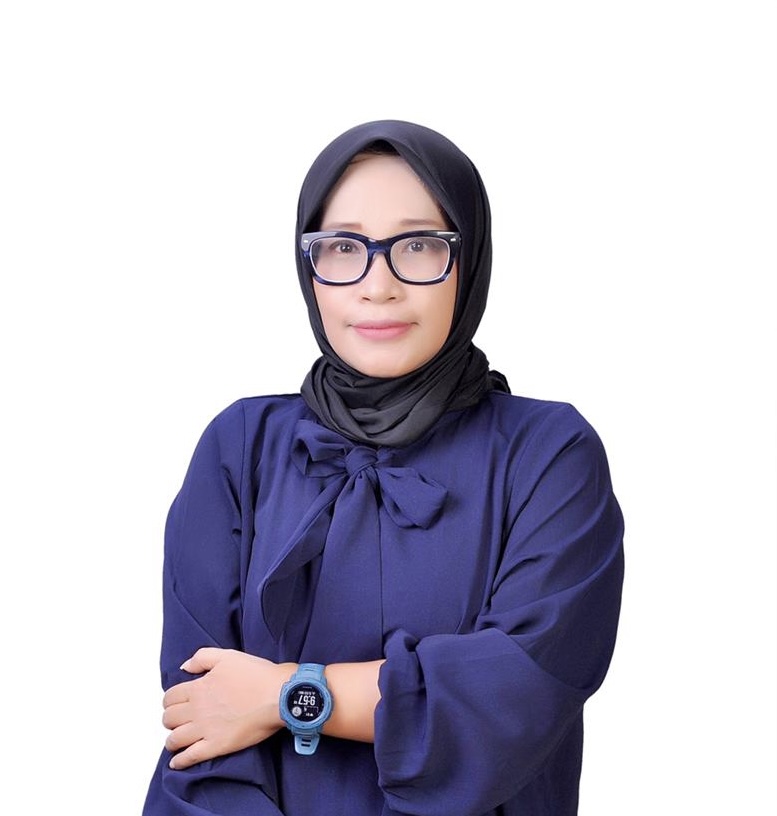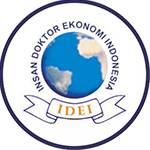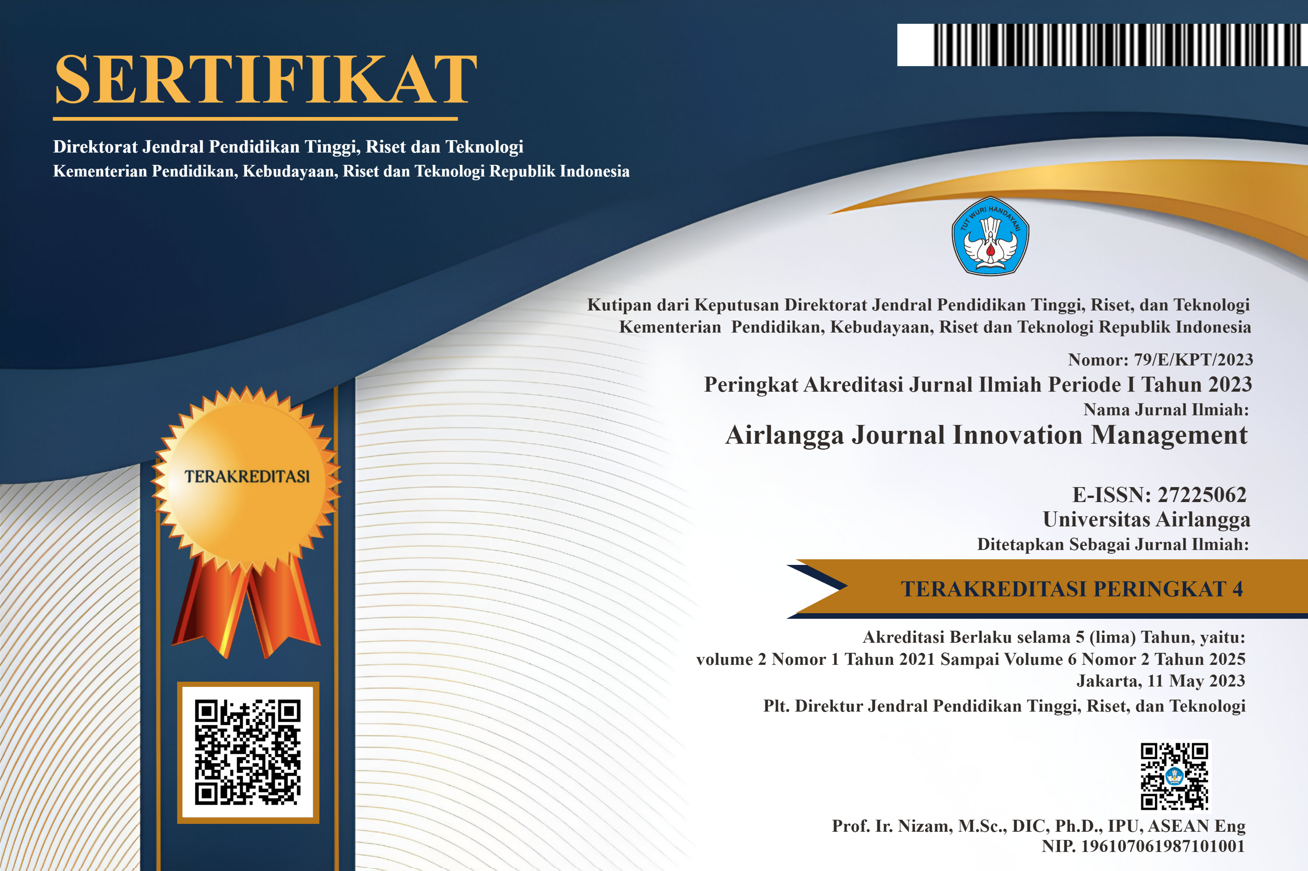The Role of Sharia Financial Inclusion in MSME Development in Sumenep (Study at BPRS Bhakti Sumekar)
Downloads
This research is intended to identify and evaluate the contribution of Sharia financial inclusion at Sharia People's Financing Bank Bhakti Sumekar to the development of MSMEs in Sumenep Regency with the dimensions of accessibility, use of products and services, and service quality. This study determined sample size followed the Roscoe formula. At least 40 MSMEs were customers of Sharia People's Financing Bank Bhakti Sumekar were obtained. To collect data, a combination of interview methods and questionnaire distribution were used. The data was analyzed using SPSS for instrument testing, descriptive statistics, multiple linear regression, classical assumption testing, and hypothesis testing. Results showed that simultaneously, the variables of accessibility, use of products and services, and service quality have a significant impact on the development of MSMEs. However, partial use of products and services does not have a big impact on the development of MSMEs. This is partly due to the limited public awareness regarding Sharia financing, as well as the frequent misuse of credit financing. The implications of this research can provide direct benefits of Islamic financial inclusion, such as easier access to financing, better financial management, and increased business capacity. This will ultimately contribute to improved MSME performance, regional economic growth, and community welfare.
Abdullah, A. (2020). Waqf and State Interference: A Phenomenology Study in Al-Azhar University, Egypt. Journal of Finance and Islamic Banking, 3(1), 38–56.
Bank Indonesia. (2021). FOUR IMPORTANT MEASURES OF PRODUCTIVE WAQF TRANSFORMATION. Www.Bi.Go.Id.
De Ree, J., Muralidharan, K., Pradhan, M., & Rogers, H. (2017). Double for nothing? experimental evidence on an unconditional teacher salary increase in indonesia. The World Bank.
Fauziana, H., Wardhana, A. K., & Rusgianto, S. (2022). The Effect of Education, Income, Unemployment, and Poverty toward the Gini Ratio in Member of OIC Countries. Daengku: Journal of Humanities and Social Sciences Innovation, 2(2), 181–191.
Febriyanti, A. R., Ratnasari, R. T., & Wardhana, A. K. (2022). The Effect of Economic Growth, Agricultural Land, and Trade Openness Moderated By Population Density on Deforestation in OIC Countries. Quantitative Economics and Management Studies, 3(2).
Ghifara, A. S., Iman, A. N., Wardhana, A. K., Rusgianto, S., & Ratnasari, R. T. (2022). The Effect of Economic Growth, Government Spending, and Human Development Index toward Inequality of Income Distribution in the Metropolitan Cities in Indonesia. Daengku: Journal of Humanities and Social Sciences Innovation, 2(4), 529–536.
Hirsanuddin, Rodliyah, & Minollah. (2021). Hybrid contract design in sharia banking product development. Journal of Legal, Ethical and Regulatory Issues, 24(Special Issue 1), 1–13. https://www.scopus.com/inward/record.uri?eid=2-s2.0-85112790597&partnerID=40&md5=e8965732431c783bac198e400893b363
Iman, A. N., Sukmana, R., Ghifara, A. S., & Wardhana, A. K. (2022). The Effect of Zakat Collection, Company Age, and Company’s Total Assets on Financial Performance of Sharia Banking in Indonesia 2019-2020. Economic Education and Entrepreneurship Journal, 5(2), 217–224.
IsDB. (2022). Awqaf Properties Investment Fund. Islamic Development Bank.
Label, D. A. N., Terhadap, H., Pembelian, K., Jamu, P., Studi, P., Industri, T., Pertanian, F., Madura, T., Raya, J., & Po, T. (2019). The Effect Of Halal Knowledge , Halal Awareness And Halal Labels On The Purchase Decision Of Abstrak PENDAHULUAN Produk bersertifikasi halal saat ini menjadi tren konsumen Muslim global . Menurut Syamsudin ( 2014 ), sertifikasi halal memiliki tujuan menin. 03(02), 95–109.
Loestefani, V., Poan, R., Suwitorahardjo, B., & Wardhana, A. K. (2022). Service Quality and Product Quality as An Influence on Customer Loyalty at Naturalis Koffie. FIRM Journal of Management Studies, 7(2), 211–236.
Mendo, A. Y., Singh, S. K., Yantu, I., Hinelo, R., Bokingo, A. H., Dungga, E. F., Juanna, A., Wardhana, A. K., Niroula, B., & Win, T. (2023). Entrepreneurial leadership and global management of COVID-19: A bibliometric study. F1000Research, 12(31), 31.
Muhaimin, H., Herachwati, N., Hadi, C., Wihara, D. S., & Wardhana, A. K. (2023). Entrepreneurship Leadership: Fostering An Entrepreneurial Spirit In Students During Pandemic Covid-19 (Case Study In Tebuireng Boarding School East Java). Journal of Namibian Studies: History Politics Culture, 33, 5597–5610.
ojk. (2021). Otoritas Jasa Keuangan. (2021). Statistik IKNB Syariah. https://www.ojk.go.id/id/kanal/syariah/data-dan-statistik/iknb-syariah/default.aspx
OJK. (2021). Direktori Jaringan Kantor Lembaga Pembiayaan Indonesia.
Pratiwi, A. C., Wardhana, A. K., & Rusgianto, S. (2022). Application of Vector Error Correction Model on Macroeconomic Variables toward Changes in the Composite Stock Price Index. Daengku: Journal of Humanities and Social Sciences Innovation, 2(2), 219–229.
Qosim, N., Ratnasari, R. T., Wardhana, A. K., Fauziana, H., & Barkah, T. T. (2023). Eight Years of Research Related to the Green Sukuk in the Global Stock Exchange Market to Support the Implementation of SDG: A Bibliometric Review. Journal of Islamic Economic and Business Research, 3(2), 161–180.
Rahman, I., Ratnasari, R. T., & Wardhana, A. K. (2022). Effect of Certificate of Bank Indonesia Sharia and Indonesian Bank Seven Days Repository Rate to Inflation Ratio in Indonesia During Covid-19 Pandemic. Economic Education and Entrepreneurship Journal, 5(1), 157–174.
Ryandono, M. N. H., Mawardi, I., Rani, L. N., Widiastuti, T., Ratnasari, R. T., & Wardhana, A. K. (2022). Trends of research topics related to Halal meat as a commodity between Scopus and Web of Science: A systematic review. F1000Research, 11(1562), 1562.
Ryandono, M. N. H., Permatasari, S. A., & Wijayanti, I. (2019). Business behavior in an islamic perspective: Case study of muslim woman entrepreneurs in Ikatan Wanita Pengusaha Indonesia (IWAPI). 12th International Conference on Business and Management Research (ICBMR 2018), 154–159.
Ryandono, M. N. H., Wijayanti, I., & Kusuma, K. A. (2020). Determinants of Investment In Islamic Crowdfunding. Muqtasid: Jurnal Ekonomi Dan Perbankan Syariah, 11(1), 70–87.
Santoso, T. B., & Kusuma, A. (2023). The Development of the Usage of Blockchain for Waqf and Zakat Globally: A Bibliometric Study. International Journal of Mechanical Computational and Manufacturing Research, 13(3), 83–91.
Silalahi, S. A. F., Fachrurazi, F., & Fahham, A. M. (2021). Factors affecting intention to adopt halal practices: case study of Indonesian small and medium enterprises. Journal of Islamic Marketing. https://doi.org/10.1108/JIMA-05-2020-0152/FULL/HTML
State of the Global Islamic Economy Report. (2023). State of the Global Islamic Economy Report. In DinarStandard.
Supriyati, & Bahri, R. S. (2020). Model Design of Accounting Information Systems for Village Owned Enterprises (BUMDes). IOP Conference Series: Materials Science and Engineering, 879(1). https://www.scopus.com/inward/record.uri?eid=2-s2.0-85091364746&doi=10.1088%2F1757-899X%2F879%2F1%2F012093&partnerID=40&md5=39b677ce3e9c1cfab09e4d5bbba2f49e
Wardhana, A. K. (2021). The Application of Waqf and Endowment Fund Based on the Principles in the Sharia Maqashid Pillar Society. Prosperity: Journal of Society and Empowerment, 1(2), 107–119. https://doi.org/10.21580/prosperity.2021.1.2.8829
Wardhana, A. K. (2022). JANJI (WA’AD) SEBAGAI JARING PENGAMAN PADA TRANSAKSI KEUANGAN DAN BISNIS SYARIAH. Jurnal Keislaman, 5(1), 124–132. https://doi.org/https://doi.org/10.54298/jk.v5i1.3412
Wardhana, A. K., & Ratnasari, R. T. (2022). Impact of Agricultural Land and the Output of Agricultural Products Moderated with Internet Users toward the Total export of Agricultural Product in Three Islamic South East Asian Countries. Iqtishodia: Jurnal Ekonomi Syariah, 7(2), 11–20.
Wardhana, A. K., Ratnasari, R. T., & Fauziana, H. (n.d.). ISLAMIC INVESTMENT IN INDONESIA BEFORE AND DURING PANDEMIC OF COVID-19: A BIBLIOMETRIC STUDY INVESTASI SYARIAH DI INDONESIA SEBELUM DAN SELAMA PANDEMI COVID-19: STUDI BIBLIOMETRIK.
Wijayanti, I., Herianingrum, S., & Ryandono, M. N. H. (2020). Islamic Crowdfunding Mechanism to Answer Renewable Energy Investment Challenge in Indonesia. Test Engineering and Management, 83, 3596–3605.
Yudha, A. T. R. C., Awwaliah, H., & Pertiwi, E. M. (2021). SDGs Value and Islamic Philantrophy Through Zakah Institution During the Covid-19. Ihtifaz: Journal of Islamic Economics, Finance, and Banking, 4(1), 31. https://doi.org/10.12928/ijiefb.v4i1.2535
Yudha, A. T. R. C., Huda, N., Maksum, M., Sherawali, S., & Wijayanti, I. (2024). The Moderating Effect of Religiosity on Fashion Uniqueness and Consciousness in Halal Fashion Purchase. Indonesian Journal of Halal Research, 6(2), 71–84.
Zaki, I., Herianingrum, S., Hapsari, M. I., Bayuny, A. F. R., & Wijayanti, I. (2024). Diversifikasi Pengolahan Frozen Nugget, Pengemasan dan Pemasaran Google Bisnis. JILPI: Jurnal Ilmiah Pengabdian Dan Inovasi, 2(3), 1–10.
Zaki, I., Widiastuti, T., Yudha, A. T. R. C., Wijayanti, I., & Mi’raj, D. A. (2020). Implementation of Islamic entrepreneurial culture in Islamic boarding schools. International Journal of Innovation, Creativity and Change, 11(11), 452–469. https://www.scopus.com/inward/record.uri?eid=2-s2.0-85083043515&partnerID=40&md5=9a6a13d9ca867c26594c27b9a7e69a14
Zakik, Z., Kamil, A., Prasetyo, A. S., Ryandono, M. N. H., & Wijayanti, I. (2022). Economic development on Madura Island through halal tourism: A business feasibility study. Al-Uqud: Journal of Islamic Economics, 6(2), 289–303.
Copyright (c) 2024 Airlangga Journal of Innovation Management

This work is licensed under a Creative Commons Attribution-NonCommercial-ShareAlike 4.0 International License.
- The journal allows authors to hold copyright without restrictions and retain publication rights without restrictions. The author retains the copyright and grants the first publication rights to the journal, with his work simultaneously licensed under the Creative Commons Attribution-NonCommercial-ShareAlike 4.0 International License (CC BY-NC-SA). This license allows others to share the work with acknowledgment of authorship and initial publication in this journal, provided that the work is not used for commercial purposes and that any derivative works must use the same license.
- Authors may enter into additional contractual agreements for non-exclusive distribution of the journal publication version (e.g., uploading it to an institutional repository or publishing it in book form), while still including acknowledgment of the initial publication in this journal.
- Authors are allowed and encouraged to upload their work online (e.g., in an institutional repository or personal website) before and during the submission process. This can support productive scientific exchanges as well as increase citations to published works.

AJIM by UNAIR is licensed under a Creative Commons Attribution-NonCommercial-ShareAlike 4.0 International License.





















